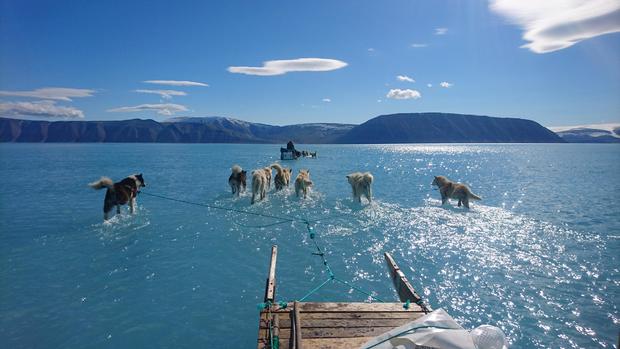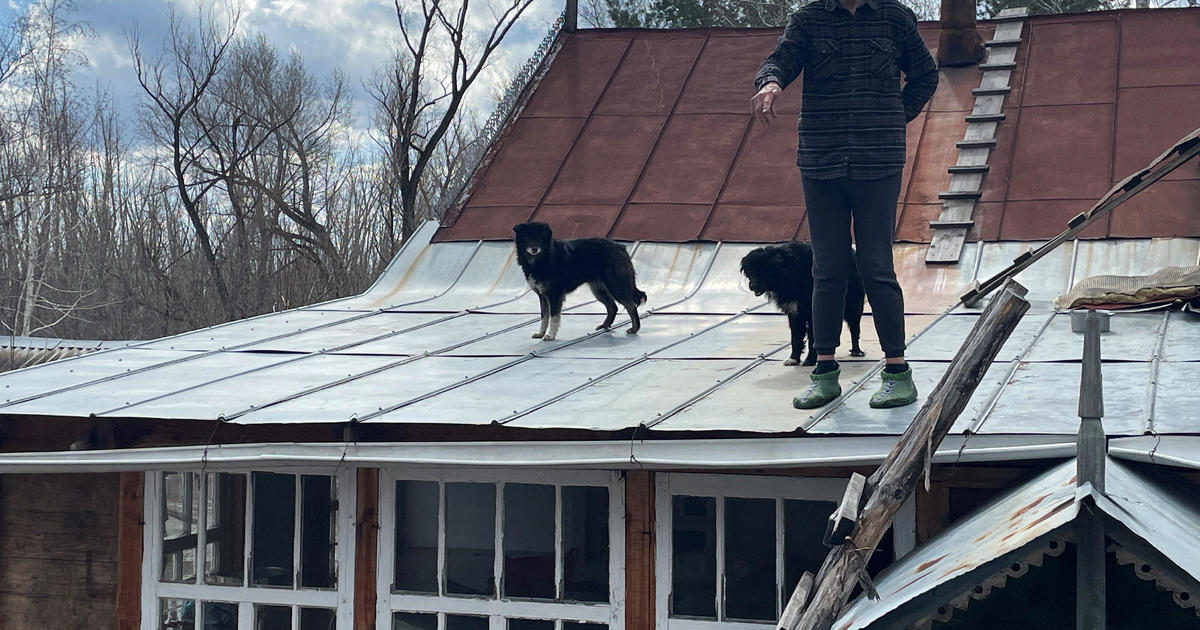Sled dogs pull scientists through meltwater amid "very warm conditions" on Greenland ice sheet
Dogs walking on water? No, but a photo snapped by climate researchers on the melting Greenland ice sheet has highlighted the "very warm conditions" in the Arctic this summer — and it is a dramatic image.
Scientists from the Denmark Meteorological Institute (DMI) have been monitoring the thickness of the Greenland ice sheet for years. Every year before the ice melts they slide out onto the sheet on dogsleds — usually traversing ice — to collect their instruments before they're swallowed up by the ocean.
"This year the expedition to retrieve the instruments ran into a lot of standing water on the sea ice," DMI climate researcher Ruth Mottram told CBS News. "The ice here forms pretty reliably every winter and is very thick which means that there are relatively few fractures for meltwater to drain through. Last week saw the onset of very warm conditions in Greenland and in fact much of the rest of the Arctic, driven by warmer air moving up from the south... This led to a lot of melting ice, both on the glaciers and ice sheet and on the still existing sea ice."
She said the temperatures last week, when the photos of the dogs wading through ankle-deep water were taken, hit about 63 degrees, according to preliminary — "pretty warm for Northern Greenland, even in summer," according to Mottram.
The DMI researchers were careful to note, however, that it was too soon to attribute the wet dog teams directly to wider global warming. They stressed that it isn't unusual to see standing water on the ice sheet — but it generally comes at least a couple weeks later in the summer.
Arctic climate amplification
As CBSN reported Sunday for a Climate Watch segment, Greenland had a warm snap last week that saw temperatures more than 40 degrees above average, leading to an estimated 2 billion tons of ice loss.
Experts believe the sudden and dramatic loss of ice this early in the summer could have a significant impact on weather across the planet.
Ted Scambos, a senior research scientist at the University of Colorado - Boulder's Earth Science Observation Center told CBSN that the Arctic takes the relatively small increase in global average temperatures "and amplifies it."
He said the earlier onset of snow and ice melt in the region "allow the surface (of the Earth) to absorb more heat, and lead to more melting," which can throw the entire balance of the planet's climatic machinery out of whack.
"There is warmth in the tropical regions and the poles are supposed to be cold, and white and radiate a lot of heat away, and that sets up a big circulation pattern that leads to all the things we think are common to weather," including the direction storms usually blow in from and the prevailing wind currents.
"Those things happen because the poles are cold, and if we start to warm the poles, and change that ice cover, we change the entire dynamic of the Earth's climate," said Scambos. "That's beginning to happen, with more severe storms, more persistent weather patterns, longer droughts; all that stuff is dependent on the fact that the ice on the ocean in the Arctic and the ice on Greenland are more or less the way they used to be, or we're going to see big changes."
Scambos said it's not too late to "put the brakes on" the rate of climate change and sea level rise, however.
"We're going to roll into a warmer climate at the end of the century, but we don't have to careen into it at breakneck speed," he told CBSN. "That's the thing that I think is being pitched more widely by the scientific community; let's adapt, let's mitigate and let's get started on a path that's slowing down the pace of global warming. That's the most important thing."




